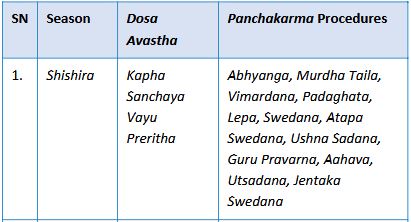Awareness of Seasonal Detoxification through Panchakarma
DOI:
https://doi.org/10.21760/jaims.9.12.22Keywords:
Ayurveda, Panchakarma, Ritu, Doshas, ShodhanaAbstract
An unhealthy lifestyle has contributed significantly to the manifestation and exacerbation of different disorders and the vitiation of Doshas. Whenever favourable conditions arise the Dosha will get further vitiated along with the seasonal influence and results into a reason for the disease Pathology. Ritucharya, or seasonal routines, is an Ayurvedic principle, and according to it, each season has a significant impact on our overall health. Panchakarma is a detoxifying and rejuvenating therapy that can balance the body, mind, and soul by regulating the three Doshas in the body. Seasonal Shodhana- a purification therapy, that expels the aggravated Doshas from the body and restores equilibrium and normalcy of Dosha even helps to maintain general health but also prevent and treat pathological consequences of many diseases. Ayurveda mentioned specific ways to perform Panchakarma, In this regard it was also specified to perform Panchakarma procedure as per the particular season. There are specific Panchakarma procedures which are indicated in particular Ritu’s similarly some Panchakarma procedures need to be avoided in particular seasonal conditions. The present article emphasizes on the role of Panchakarma in seasonal detoxification, as everybody strives for a good healthy life, rather than just a number of years without a good health.
Downloads
References
Sharma RK, Dash B. Caraka Samhita. Vol I, Sutrasthana. Varanasi: Cowkhamba Sanskrit Series Office; 2011. p. 600.
Mishra YC. Padartha Vijnana. Varanasi: Chaukhambha Sanskrit Sansthan; 2012. p. 120-122.
Kashinath S. Agnivesh’s Charaka Samhita with Ayurveda Dipika Commentary by Chakrapanidatta with Vidyotini Hindi commentary. Part 1, Sutrasthana. Varanasi: Chaukambha Sanskrit Academy; 2018. p. 6/2-17.
Sharma RK, Dash B. Charaka Samhita. Vol VI, Siddhisthana. Varanasi: Cowkhamba Sanskrit Series Office; 2011. p. 6/18 19: 266.
Kar PK. Principles and Practice of Panchakarma. Delhi: Chaukhamba Sanskrit Pratishthan; 2013. p. 25.
Sharma RK, Dash B. Charaka Samhita. Vol VI, Siddhisthana. Varanasi: Cowkhamba Sanskrit Series Office; 2011. p. 6/18 19: 266.
Paradkar H, editor. Ashtanga Hridaya, Commentary by Arunadatta and Hemadri, Sutra Sthana. Varanasi: Chaukambha Krishnada Academy; 2009. p. 3-15.
Kashinath S. Agnivesh’s Charaka Samhita with Ayurveda Dipika Commentary by Chakrapanidatta with Vidyotini Hindi commentary. Part 1, Sutrasthana. Varanasi: Chaukambha Sanskrit Academy; 2018. p. 13/18: 259.
Kashinath S. Agnivesh’s Charaka Samhita with Ayurveda Dipika Commentary by Chakrapanidatta with Vidyotini Hindi commentary. Part 1, Sutrasthana. Varanasi: Chaukambha Sanskrit Academy; 2018. p. 13/18: 259.
Kashinath S. Agnivesh’s Charaka Samhita with Ayurveda Dipika Commentary by Chakrapanidatta with Vidyotini Hindi commentary. Part 1, Sutrasthana. Varanasi: Chaukambha Sanskrit Academy; 2018. p. 13/18: 259.















